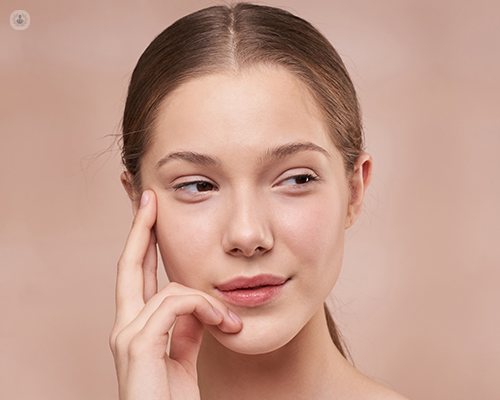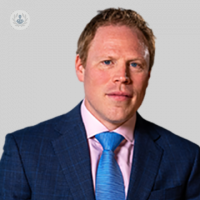Can you have a rhinoplasty (nose job) if you have body dysmorphia?
Written in association with:If you have a consultation about having a rhinoplasty (nose job), you might be asked about body dysmorphia. This disorder is a psychological condition where patients fixate on their appearance, seeing flaws and defects that are minor or non-existent to others.
Mr Jonathan Joseph, an otolaryngologist who takes body dysmorphia in patients seeking rhinoplasty very seriously, explains how this issue can be dealt with so that patients get the best outcome possible.

Why might someone want to have cosmetic rhinoplasty?
There are numerous reasons why someone may consider a cosmetic rhinoplasty.
Nasal obstruction
Many of my patients have thought for a long time that they don’t particularly like the shape of their nose. However, they are not affected enough to consider surgery. What can change this is suffering from nasal obstruction.
Frequently, a nose which is visibly deviated or deformed will have a similarly crooked septum, causing an obstruction. If someone needs functional rhinoplasty surgery to treat the obstruction, they will often ask me to improve the nose cosmetically at the same time.
Social media and ‘selfies’
Over recent years, people are becoming more aware of their appearance through social media and selfies. Since the beginning of the coronavirus COVID-19 pandemic and the upsurge in online meetings, many of my patients are now seeing their faces more often and have noticed ‘problems‘ with their nose that they now feel need addressing.
Self-consciousness
Other people feel self-conscious about the appearance of their nose, particularly if they are a performer or appear in public frequently. Correcting a deformity can boost their confidence and allow the person to move on with their life more freely.
How might body dysmorphia play a part and is it a common condition in patients?
Body dysmorphia is a condition that all rhinoplasty surgeons must be aware of. It is characterised by a disproportionate concern that a person has over a perceived or non-existent cosmetic deformity. What’s more, the nose is the most common part of the body affected by this.
In fact, a study that I performed in a large NHS clinic that performs rhinoplasty found that up to 30% of patients referred for consideration of nasal surgery had features of body dysmorphia.
What assessment do you and your team make in a patient who wants a nose job?
The most useful assessment I make is through talking to the patient. I want to understand
- Their motivations for considering surgery.
- Their expectations for the outcome.
I often ask how they think it will change their life by having the operation. I will be concerned if their expectations seem unrealistic as they may ultimately be disappointed. I will also be concerned if the severity of deformity seems minor compared with the level of concern to the patient. A useful questionnaire I often use is called the Body Dysmorphic Disorder Questionnaire. It focuses on several factors including:
- Whether the nose is the main body part the patient is concerned about.
- How much it impacts their daily life.
- How often during the day they think about their nose.
If they score highly on this questionnaire, I will recommend a review with my psychology colleague who is an expert in this field.
Will you still perform a rhinoplasty if you recognise that your patient has body dysmorphia?
Ideally, any patient with body dysmorphia will have been to see the psychologist. If it is felt that the body dysmorphia is moderate or severe, I would not operate. This is because it’s highly likely that the patient will be disappointed and dissatisfied with the outcome and the patient’s quality of life will not be improved. In some cases, it could even deteriorate.
If, however, the dysmorphia is mild, with some support from both me and the psychologist, they can be in a position where cosmetic rhinoplasty is the right thing for their confidence and can lead to an excellent outcome. One of the important changes that would ideally occur before operating would be a reduction in the amount of time the person spends thinking about their nose per day so they are not persistently checking it and looking in mirrors. They should also be able to go about normal social activities without restriction.
What are the risks of rhinoplasty for a patient with body dysmorphia?
If a patient has body dysmorphia and undergoes a rhinoplasty, they are likely to be unhappy with the outcome, even if a plan has been agreed beforehand. They may also find that the benefits they were hoping for in their life do not materialise. The patient must also be able to cope with the possibility that the outcome is not exactly according to the plan due to the complexity of the procedure and post-operative complications.
Even if they are happy with the nasal appearance, they may find other parts of the body they are unhappy with and will now focus on these. Many patients with body dysmorphia have had multiple procedures on different parts of the body.
How do you manage the patient's expectations?
I make sure that patients are aware of the risks of the surgery and that I cannot guarantee their desired outcome is 100% met. Clinical photography is very helpful to show the patient the exact nature of their current nose. I use software to change the appearance of the nose as a proposal for the changes to be made with surgery. Being realistic with these images is extremely important and also the fact that the outcome is not guaranteed. I try to emphasise that perfection is often not possible. I aim to achieve significant improvement so that they are satisfied and more confident.
Learn how you can benefit from Mr Joseph’s expertise in functional and cosmetic rhinoplasty – visit his profile.


